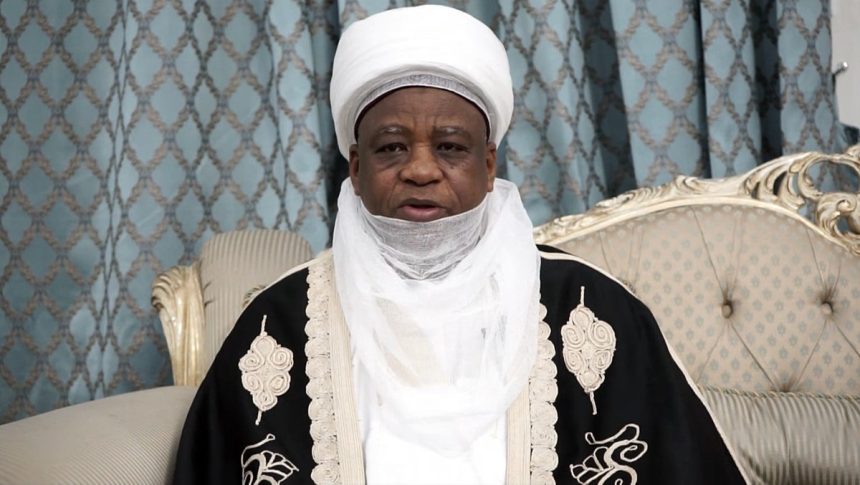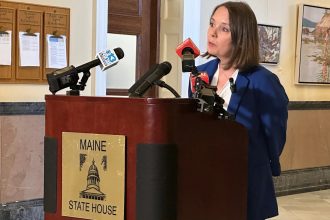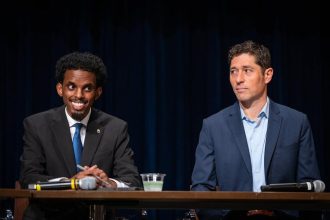The Sultan of Sokoto, Muhammadu Sa’ad Abubakar III, has called on the leaders in the country to listen to the cries of Nigerians with compassion rather than responding with harshness.
This is as he said peace cannot be achieved without justice.
Speaking on Wednesday in Abuja during the NASFAT History Book Launching to mark the 30th anniversary of the organisation, the Sultan said rather than using “koboko” when citizens express concerns, leaders should respond with empathy and offer reassurance that things will improve.
He urged leaders to treat the people like their own children in times of hardship.
“I call on our leaders to look at all of us with that sympathy of father and child. Whatever problems you are having, whatever cries you are hearing, don’t carry a koboko and whip people. Carry some soft hands and touch somebody and say look, things will be okay,” he said.
Speaking on the need to address injustice, the Sultan described justice as the foundation of any society.
He said, “Justice is the foundation of any society. a nation can endure with unbelief, but it cannot endure with injustice. So let’s face justice in whatever we do.
“Our leaders, our followers all need to be just in whatever we do. And I believe conscience is an open wound, only truth can heal it. Conscience is an open wound, only truth can heal it.
“Let’s tell ourselves the whole truth in whatever we do, how we do things. And let’s believe in almighty Allah as the owner of heaven and earth, as owner of everything and all of us, who brought us into this world to worship him.
“So, keep on doing the good work, and leave the rest to almighty Allah to bless all of us, as Muslims, as non-Muslims in this great country.
He also stressed that education is key to resolving Nigeria’s security and development challenges, warning that ignorance fuels unrest and instability.
The sultan said, “When you educate somebody, he becomes an asset to you and to the community. But somebody who is not educated is a very big problem.
“Lack of education is pushing people to do things they are not supposed to do… and that is why we have crises all over the world.”
The Sultan also called for prayers for leaders at all levels, adding that good governance benefits everyone.
He said, “Let’s pray for our leaders every time. From Mr. President to all the governors, to all the local chairmen, to all our leaders at all levels.
“We need to pray for our leaders to do right, to do just. If you pray for your leader, he does good things, you enjoy. If you are lying to his whims and caprices, he does bad things, you will suffer.
“So let’s all just pray for our leaders. I want to say this, every time I have an opportunity like this, I want to say please pray for our leaders, for good health, for direction, and for that steadfastness of knowing that you as a leader, you will account for whatever you have done on earth to the almighty Allah.”
Earlier in his welcome address, the President of NASFAT, Ayodeji Abdulrauf, said the book was more than just pages bound together, adding that it was a living testimony to the vision, sacrifice, resilience, and unwavering faith of those who laid the foundation of NASFAT 30 years ago (5th March, 1995).
He added, “It is a written reflection of our journey from humble prayer group meetings in Lagos to a global faith-based organisation impacting lives across continents.
“NASFAT symbolises the positive impact of a faith-based organisation helping the society in promoting social welfare, education, healthcare, and morals. This book is a valuable resource for understanding our past and a tool for inspiring future generations.
“As we celebrate our 30th Anniversary this year, this publication is a gift to posterity. It tells our story with candour and clarity how young Muslim professionals, inspired by the need for spiritual connection and community building, came together to create a movement that would redefine Islamic propagation in Nigeria and beyond with over 360 locations across the globe.”









